Book Summary: Wînipêk: Visions of Canada from an Indigenous Centre by Niigaan Sinclair
Wînipêk: Visions of Canada from an Indigenous Centre is a compilation of 79 essays by Niigaan Sinclair, an Anishinaabe scholar and writer, as well as opening keynote at the 2025 Polytechnic Showcase. Divided into four parts – The Land, This Place, Streets and Rivers, and Gifts – the essays are concise and powerful, each offering a minute reflection of Indigenous life and experience in Canada.
The book speaks to the complexities of Indigenous life in Winnipeg, a city that is home to Canada’s largest urban Indigenous population with nearly 91,000 Indigenous residents (~12 per cent of its population) in 2021. It tackles themes of colonialism, resilience and reconciliation while exploring the stories and people behind the headlines.
Read More > “Book Summary: Wînipêk: Visions of Canada from an Indigenous Centre by Niigaan Sinclair”






